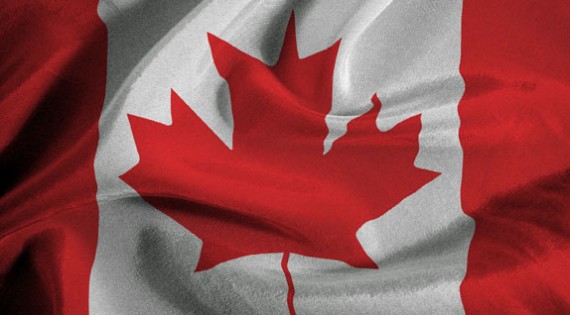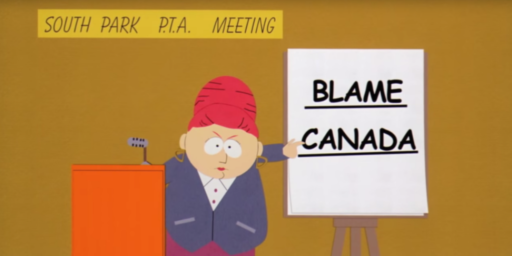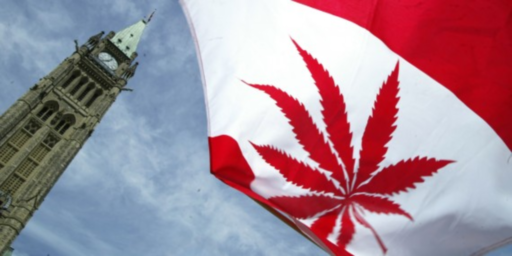An Electoral Earthquake In Alberta
Possibly big news out of Canada
There was nothing short of a political earthquake in Alberta, Canada yesterday, with the leftist New Democratic Party unseating the Progressive Conservative Party, which had controlled the province for more than forty-three years:
OTTAWA — With an economy dominated by the oil industry and a conservative, free-market political tradition, Alberta has long been cast as the Texas of Canada. But on Tuesday night, not only did the province’s voters put the Progressive Conservative Party out of power after 43 years, they elected a government from the far left of Canada’s mainstream political spectrum.
The unexpected rise of the New Democratic Party, which was partly founded by labor unions, may have implications for Alberta’s oil sands, which, many critics say, enjoyed a light regulatory touch under Conservative governments. And with a federal election coming up this year, the result will not be welcomed by Prime Minister Stephen Harper, a Conservative whose party’s power base is in Alberta, along with his own parliamentary constituency.
The New Democrats had always been distant also-rans in Canada’s most conservative province. But less than an hour after the polls closed Tuesday, the Canadian Broadcasting Corporation declared that the party, under its leader Rachel Notley, would hold a strong majority of seats in the provincial legislature.
Preliminary results indicated that New Democrats would rise from four seats to 53, while the Conservatives would fall to third place, with 11 seats, behind the Wildrose Party, another right-of-center group, with 21.
The defeat of the Conservatives followed a budget crisis brought on by declining oil prices. Six months ago, the party brought in Jim Prentice, a former member of Mr. Harper’s federal cabinet, to replace a leader who had been accused of profligate personal spending.
Duane Bratt, the chairman of policy studies at Mount Royal University in Calgary, Alberta, said that Mr. Prentice and his party failed because they simply attacked their opponents rather than deal with the issues that had led to growing disaffection among voters. “They ran a fear-and-loathing campaign again,” Mr. Bratt said before Tuesday’s results were announced.
Mr. Prentice resigned as the party’s leader after the results became clear, as well as from his seat in the legislature, to which he had been narrowly re-elected.
The CBC calls the results a “massive shock that turns Canadian politics on its head,” and it’s hard to disagree with that. From the American point of view, it would be roughly the equivalent of Republicans taking overwhelming control of the Massachusetts legislature, or Democrats taking over Texas. The interesting question going forward will be whether this result is something that is unique to the situation that Alberta found itself thanks to the collapse in world oil prices and the inability of the ruling party to put together its own coherent message, perhaps because they had gotten used to being in power, or whether it portends something broader for Canadian politics. On the local level, Alberta has benefited greatly in recent years from the shale oil boom that has brought jobs and money to a part of the province that was previously quite sparsely populated, similar to the economic impact that shale oill has had on the other side of the border in North Dakota. The decline in worldwide oil prices, though, presents unique problems for the shale oil industry because it is far more expensive to extract from the ground. This means both lower profits for shale oil in general even in boom years, and it means that the industry is vulnerable when prices decline below the level where it is economically viable to even bother extracting it. The decline in oil prices has had a definite impact in both Alberta and North Dakota, although it has been far from a complete bust, and this decline in revenue has apparently had an impact on the provinces finances, no doubt due to the decline in tax and other revenues that the industry generates. That, combined with what seems from a distance to be complacency on the part of the Progressive Conservatives along with a lackluster re-election campaign.
The interesting question is whether these results in Alberta are any indication of what may be going in Canada as a whole. Canada’s next round of Federal Elections will be hell on October 19th, although that date could apparently be moved up at some point. Presently the Progressive Conservative’s, led by Prime Minister Stephen Harper, hold a majority in the House of Commons, but these results in Alberta could mean that the political future in our neighbor to the north is about to get interesting. At the very least, they are likely to be a psychological boost to the opposition, which in itself is important in these types of elections. In any case, Alberta doesn’t make the news here in the United States very often, but this could be one of those times that it is an indicator of major political change to come in our neighbor to the north.







Up here there have always been two signs of the coming apocalypse.
One would be the Toronto Maple Leafs winning the Stanley Cup again. The other is the PC’s losing an election in Alberta.
We’re half way there. Luckily we can count on the Leafs continuing to lose.
Doug, comparing Alberta to Texas is unfair to Alberta. Obviously enough there is a sentient majority in Alberta.
My wife is from Alberta, and her family (almost all in the oil business) definitely didn’t back the NDP. It’ll be interesting to see what change this brings.
Doug, I assume you meant our election will be held on October 19th? Or are you tired of Harper and Trudeau already?
This is an interesting result. The Progressive Conservative party was almost wiped out in the 90’s, it wound up merging with the far more right wing Reform Party but kept the PC name. The Reform movement had started in Alberta.
The problem with voodoo economics, when there’s a downturn, voters find out it would have been better to put up a nest egg for lean times than to reduce taxes so the rich get richer. Let’s see how long they remember.
I’m hoping that maybe the public is realizing that conservative voodoo economics (“tax cuts cure everything) dion’t work. Early days, yet.
Maybe it has more in common with Arkansas where “Drill, baby, drill!” is now “What’s up with all these earthquakes?”
Maybe the people of Alberta that aren’t in the oil business are sick of the environmental damage being done? I ask because I don’t know, so if anyone is familiar with the situation there I would like to be enlightened.
For Harper, let’s hope so!
It’s worth pointing out that conservative parties won a majority of the vote, but since their vote was split and Canada has a FPTP system, the NDP got a majority of the seats. That the NDP won a plurality is a big deal, and they arguably might have won a majority under a different system, but we don’t really know that either way.
I’d like to see Steven Taylor do a post on this.
We have an entire political party dedicated to the promulgation of fear and loathing.
The issue is whether the NDP sustains and builds on this up to the October elections.
Earthquakes of several different kinds have apparently resulted from hydraulic fracking. I bet we’ll be seeing more and more disruptions as North America enters the up-and-down road of oil producing economies.
That is incorrect – Stephen Harper leads the Conservative Party of Canada, not the Progressive Conservative party, which ceased to exist at the federal level in 2003 when it merged with the Canadian Alliance (and Harper was the former leader of the Alliance, not the PCs).
@Alex: … and the former Alliance party mostly went Wildrose, from what I understand. At least it’s conservative faction.
@Trumwill:
Same could be said about the last couple of national elections in Canada. In 2011, 61.2% of the votes were cast for center/center-left or center-left parties, yet the center/center-right party got 53.9% of the seats with only 39.6% of the votes.
Though, there have been polling that indicated that if the center/center-left parties were merged into one party, voters would abandon it for the Conservatives.
@PJ: Right. I wrote about it here, if anyone is interested. There is nothing wrong with single-member districts provided that the electorate is content with two parties. But both Canada and the UK have an ongoing problem with plurality elections. They don’t have to go multi-member, but they should go with IRV. (Which so should we, even if it hasn’t been as big a problem here except for Maine and bits and pieces here and there.)
That’s why I would love Taylor to talk about this.
Do you have any links to the polling you mention? I’m really curious in the case of Alberta whether PC voters would have preferred the NDP or WR.
@OzarkHillbilly:
Given that everyone expects demographics to give TX to the Dems, perhaps OK would be a better example.
I originally did a double take when I heard this news because I got the Canadian NDP confused with the German NDP.
@trumwill:
I think you’re mixing up the federal and provincial parties. Harper was federal Canadian Alliance leader and became federal Conservative leader when they merged with the federal Progressive Conservatives. Wildrose is a breakaway from the provincial Progressive Conservative party, although many of their key members returned to the PC fold this election.
And Alberta has oil sands, not oil shale. No fracking required, although the environmental costs are still very high and even more obvious as the stuff is strip mined..
@John H: I might be. My understanding is that when at the federal level you had the PC and the Alliance, at the provincial level they had the PC and the Alberta Alliance. When the national parties merged, the provincial parties didn’t. The Alberta Alliance then split with the moderates going to the Alberta Party (and elsewhere) and the conservatives merging with and took over the upstart Wildrose Party. So while Harper was a part of the Canadian Alliance, he and his party were more aligned (more or less) with the Alberta Alliance for which the Wildrose Party is the spiritual successor.
Is this wrong?
It should be pointed out that the Conservatives in Canada (including in Alberta) are to the left of the Democrats in the USA on most issues (for instance, they maintain a single payer gov’t health system, with a private option – something like Obama care wouldn’t fly except for a few percent of Conservative Party voters because it would mean dismantling gov’t health care, and almost no one wants that).
And the differences between Conservatives and the NDP in provincial politics (the NDP have had gov’ts in BC, Saskatchewan and Manitoba) is 95% in rhetoric, in practice there’s almost no difference in actual legislation or budgets (there have been masters and Phd theses in political science examining this, its pretty startling how little real change comes with big shifts in rhetoric – though even the Conservative rhetoric is to the left of the Democrats in the USA).
As well, many would argue that change of gov’t after even ten years is a good thing, no matter who is in power.
There’s a tendency in America to project American politics onto other countries, and it doesn’t work. Alberta is the most right wing province in Canada, but is for the most part to the left of Massachusetts politically, let alone identical to Texas.
Oil wasn’t even on the table in this election. I’m sure that’s what Americans care about but in Alberta the existence of oil is a fact of life, not a political hot potato. It would be like voting based on the mountains.
The big issues were corruption, lack of accountability, poor economic planning, and hubris. The PCs were seen as corrupt, out of touch, self-important, and smug. Prentice turned foot-in-mouth disease into an art form; his snarky comment directed at Notley about how “math was hard” in the debate lost the PCs ten points – almost fifteen among woman voters.
The big decision facing Alberta voters was which opposition party to vote for. Despite the obvious huge policy gap between Wildrose and the NDP, many voters found it difficult to decide between the two because both parties are perceived as fundamentally honest and that’s what voters were looking for above all else. The NDP won because a) Notley impressed everyone both in the debate and on the campaign trail, and b) despite its sterling reputation for probity, Wildrose still carries a homophobic taint that just isn’t going to fly in the cities.
@Trumwill:
No, that’s pretty much how the conservative soap opera of the last three decades went.
@Trumwill:
You are more or less correct, but while the Alberta Alliance and Wild Rose Parties did merge, they were insignificant both apart and together until a number of PCs jumped ship and went to the WRP.
Federally you had Reform under Preston Manning, which did very well. Manning was convinced a united right would win power and formed the Canadian Alliance out of the Reform party, which rejected Manning in favour of a pretty face, Stockwell Day. It also originally had the unfortunate name “Canadian Conservative Reform Alliance” which, if you added Party to the end was CCRAP. Day did poorly in the east in the next election. He was replaced by Harper.
The PCs avoided a merger until Joe Clark retired and Peter McKay won leadership (over Jim Prentice among others). He then merged the parties with Harper and they are the Conservative Party of Canada.